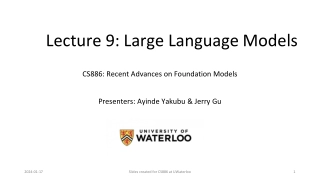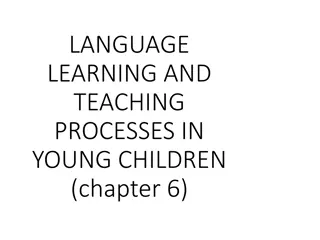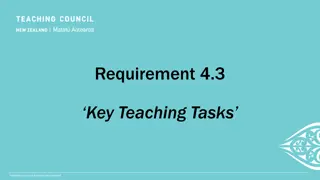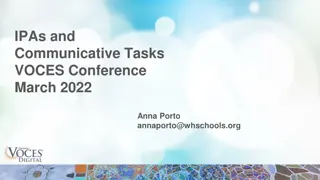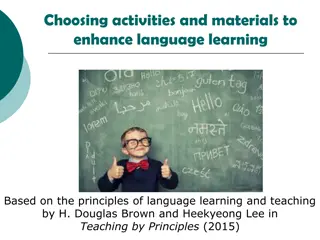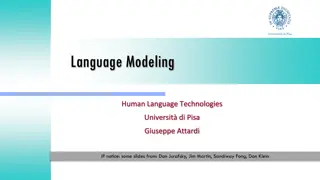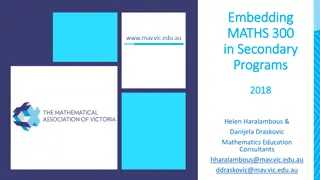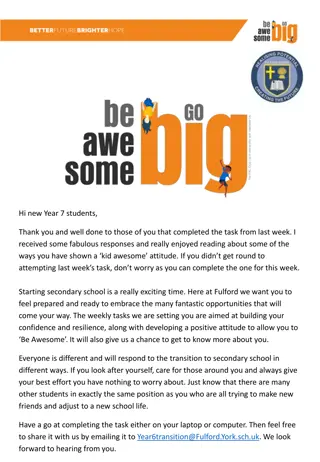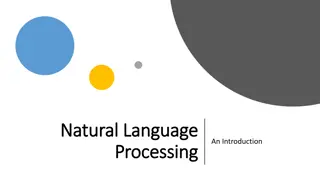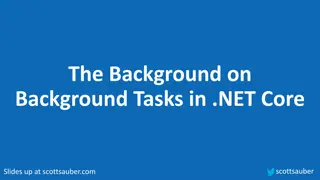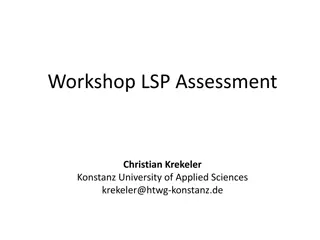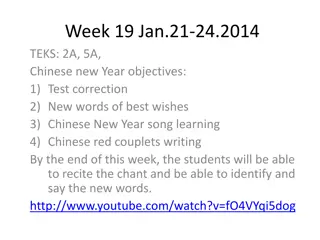Understanding Types of Tasks in Language Learning
Explore different types of tasks in language learning, including real-life tasks, pedagogic tasks, input-based tasks, output-based tasks, unfocused tasks, and focused tasks. Discover the language skills involved, types of outcomes students need to produce, and examples of task classifications.
Download Presentation

Please find below an Image/Link to download the presentation.
The content on the website is provided AS IS for your information and personal use only. It may not be sold, licensed, or shared on other websites without obtaining consent from the author. Download presentation by click this link. If you encounter any issues during the download, it is possible that the publisher has removed the file from their server.
E N D
Presentation Transcript
Types of Tasks PART 2
Glossary Real-life tasks - Pedagogic tasks Input-based tasks Output-based tasks Unfocused Focused tasks
Types of tasks Real-life tasks vs. pedagogic tasks Input-based vs. output-based tasks Closed vs. open tasks Unfocused vs. focused tasks https://samaryahyia.wordpress.com/2012/10/12/tblt/
Task types Unfocused Tasks Focused Tasks No predetermined language focus Example: Students discuss how to allocate funding to competing community projects particular linguistic forms. Spot the difference task. https://www.tes.com/teaching-resource/spot-the-difference-picture- stimulus-speaking-6046075
Real-world Tasks Pedagogic Tasks Simpler versions of real-world tasks that language learners can work on in language classes. Tasks that people do in their everyday life: Shopping for groceries Prepare learners for future task performance in real life situations: Filling forms Writing emails Ordering food in restaurants Listening to lectures Job interview practice Writing emails May not have any relevance to what students do outside of the class. Story retelling Language games https://www.clipartmax.com/middle/m2i8i8d3m2G6 b1b1_job-interview-cartoon-clip-art-dibujo-de-una- entrevista/ https://www.google.com.au/search?q=food+ordering+cartoon&rlz= 1C1GGRV_enAU815AU815&source=lnms&tbm=isch&sa=X&ved=0ahU KEwiR7vfa- engAhWTfisKHRoiBT0Q_AUIDigB&biw=1904&bih=964#imgrc=FIi5FZsXT8Z 4TM: https://classroomclipart.com/clipart-view/Computers/tutor- teaching-student-to-use-computerith-tutor_jpg.htm
What language skills are involved in performing this task? Pedagogic classification Output-based Tasks Input-based Tasks No production. Listening and reading during task. Producing language in the form of spoken or written. Examples Most of the tasks Listening to an announcement Reading an article
What type of outcome are students required to produce? Open Tasks Closed Tasks Predetermined outcome. No predetermined outcome Spot the difference task. Students are free to come up with an ending for a story. Story sequencing task. https://www.tes.com/teaching-resource/write-a-new-ending-to-a-traditional-tale-ppt- 6100982 https://www.pinterest.com.au/pin/325455510566885902
Task classifications - Questions 1. What language skills are involved in performing this task? Input-based (listening/reading)/output-based (writing/speaking) Listing, ordering, comparing, problem-solving, sharing experiences, etc. 2. What kind of processing demands does this task place on students? information gap/ reasoning gap/ opinion gap 3. What type of outcome are students required to produce? Open/closed
What kind of processing demands does this task place on students? Cognitive classification 1. Information gap e.g., completing a chart 2. Reasoning gap e.g., working out teacher s timetable from a set of class timetable 3. Opinion gap e.g., discussion, story completion
Exercise - Focused or Unfocused? Look at the e-mail message below. Listen to Mr. Parker s instructions on the tape. Make notes if you want to. Then write a suitable reply to Lia. You are the owner of a private language school and have advertised for a new English teacher. Below are summaries of the CVs of two applicants. Discuss each applicant and then decide which one to offer the job to. Mike, aged 30 B.A. in social studies. Has spent a year working his way round the world. Has spent six years teaching economics in state school. Has written a highly successful novel about teachers. Has lived in a back-to-nature commune for two years. Has been married twice - now divorced. Two children. Has been running local youth group for three years. BETTY, aged 45 Has been married for 24 years, three children. Has not worked most of that time. Has done evening courses in youth guidance. Has spent the last year teaching pupils privately for state with good results. Has been constantly active in local government - has been elected to local council twice. Dear Mr. Parker Please send flight number, date and time of arrivaland I will arrange for someone to meet you at theairport. Lia Unfocused Focused
Suiting the task type to the learner Type of learner Beginner learners Intermediate learners Type of task Pedagogic, input-based, closed Pedagogic, input-based & output-based tasks; some focused task;, mixture of pedagogic & real-life tasks; mixture of closed & open tasks Mainly output-based tasks; focused tasks; real-life tasks; mainly open tasks Real-life tasks; input based & output based; closed & open tasks Advanced learners Special purpose learners (ESP)


